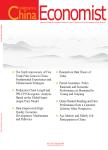China’s financial conundrum and global imbalances
China’s financial conundrum and global imbalances作者机构:Professor of International Economics at Stanford University Professor of International Economics at Leipzig University
出 版 物:《China Economist》 (中国经济学人(英文版))
年 卷 期:2009年第4卷第4期
页 面:65-77页
学科分类:12[管理学] 02[经济学] 0202[经济学-应用经济学] 03[法学] 0302[法学-政治学] 1201[管理学-管理科学与工程(可授管理学、工学学位)] 020206[经济学-国际贸易学] 030206[法学-国际政治] 020204[经济学-金融学(含∶保险学)] 020202[经济学-区域经济学]
主 题:China Finance RMB Exchange Rate Global Imbalances Key words: China finance RMB exchange rate global imbalances
摘 要:China’s financial conundrum arises from two sources: (1) its large trade (saving) surplus results in a currency mismatch because it is an immature creditor that cannot lend in its own currency. Instead foreign currency claims (largely dollars) build up within domestic financial institutions. And (2) economists – both American and Chinese – mistakenly attribute the surpluses to an undervalued renminbi. To placate the United States, the result is a gradual appreciation of the renminbi against the dollar of 6% or more per year. This predictable appreciation since 2004, and the fall in US interest rates since mid 2007, not only attracts hot money inflows but inhibits private capital outflows from financing China’s huge trade surplus. This one-way bet in the foreign exchange markets can no longer be offset by relatively low interest rates in China compared to the United States, as had been the case in 2005-06. Thus, the People’s Bank of China (PBOC) now must intervene heavily to prevent the renminbi from ratcheting upwards – and so becomes the country’s sole international financial intermediary. Despite massive efforts by the PBOC to sterilize the monetary consequences of the reserve buildup, inflation in China is increasing, with excess liquidity that spills over into the world economy. China has been transformed from a deflationary force on American and European price levels into an inflationary one. Because of the currency mismatch, floating the RMB is neither feasible nor desirable – and a higher RMB would not reduce China’s trade surplus. Instead, monetary control and normal private-sector finance for the trade surplus require a return to a credibly fixed nominal yuan/dollar rate similar to that which existed between 1995 and 2004. But for any newly reset yuan/dollar rate to be credible as a monetary anchor, foreign China bashing to get the RMB up must end. Currency stabilization would allow the PBOC to regain monetary control and quash inflation. Only then can th



